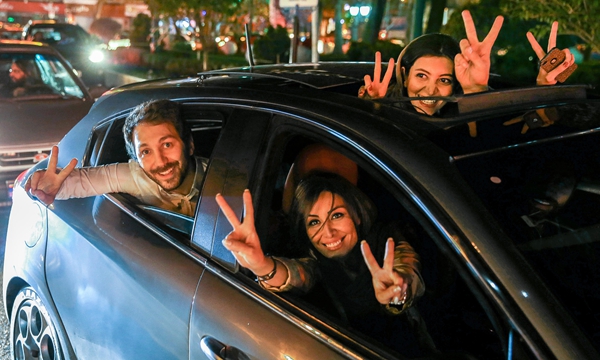Iran's foreign policy after the nuclear deal
- By Mohsen Shariatinia and Ehsan Razani
 0 Comment(s)
0 Comment(s) Print
Print E-mail China.org.cn, August 12, 2015
E-mail China.org.cn, August 12, 2015
|
|
|
Iranians celebrate preliminary nuclear deal |
The Vienna Nuclear Agreement is considered one of the key events in international politics in the post-Cold War era. Undoubtedly, the Vienna agreement will act as a source of some changes in the foreign policies of many countries.
Needless to say, Iranian foreign policy will be the most affected, even though the new developments will not necessarily lead to a strategic shift in the foreign policy of the Islamic Republic. The agreement will enhance Iran's freedom of action in the international arena. Therefore, it will provide the country with better conditions for pursuing the "Constructive Engagement" policy declared by President Hassan Rouhani. The policy that was theorized by the president during the eight-year period of his service as the head of the Center for Strategic Research has become the dominant concept in the Iranians foreign policy under Rouhani. In his speech at the Davos Conference in 2013, Rouhani described the constructive engagement as a way to exploit the international potential for the country's economic development.
As a result of the Vienna agreement and the gradual removal of sanctions, economic diplomacy will gain a special position in Iranian foreign policy and will lead the government strive to exploit the new atmosphere to improve the country's economic situation. Along these lines, it is likely that Iran's relations with the rising powers, such as China, Russia and India, will expand rapidly. The wide range of overlapping interests between the two sides as well as the lifting of sanctions as the most important obstacle to the country's integration into the international community, will pave the way for Iran to cultivate a more proactive relationship with the mentioned powers.
Another change in Iranian foreign policy will occur in its relationship with the European Union. After years of restrained relationships, visits made by the German vice chancellor and the French foreign minister to Iran can be considered as the first signs of change in Iran-EU relations. As Iran and the European powers still have major disagreements on several issues, such as the Palestine-Israeli conflict, human rights, and their different approaches to Arab countries, as well as Saudi Arabia and the Middle East politics, such a change would be seriously difficult.







Go to Forum >>0 Comment(s)